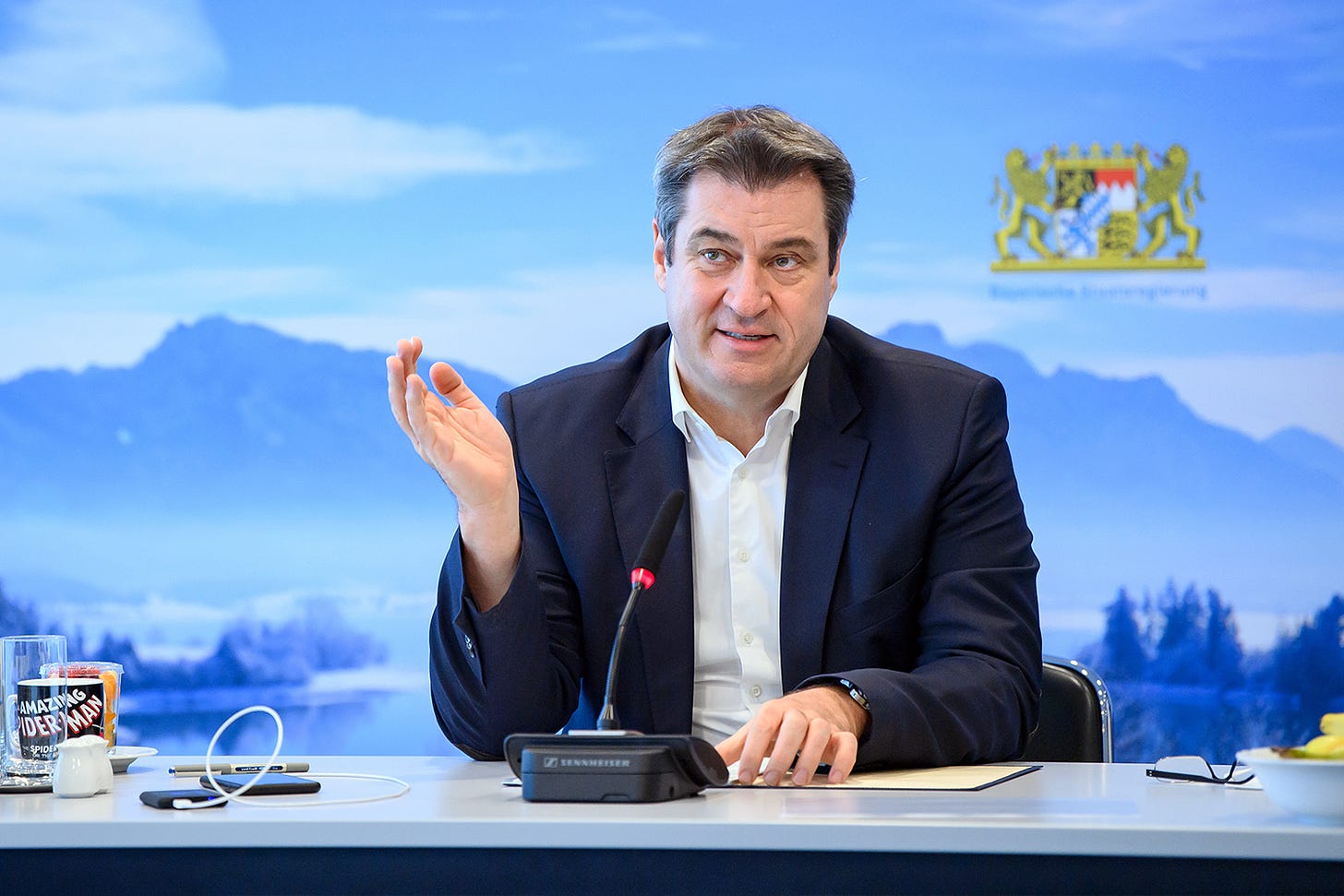Söder Can Give Germany's Christian Democrats Fresh Start
Armin Laschet is not the man to lead Germany out of the COVID-19 crisis.

Bavaria’s Christian Democrats have called for a poll of elected party officials to select the conservatives’ joint chancellor candidate for the election in September.
Leaders of the Christian Democratic Union (CDU), which competes in fifteen of Germany’s sixteen states, have thrown their weight behind Armin Laschet, the prime minister of North Rhine-Westphalia.
But many conservatives across the country think they stand a better chance with Markus Söder of Bavaria, who leads the state’s Christian Social Union (CSU).
They’re right.
Fallen
Laschet is not the man to lead Germany out of the COVID-19 crisis. In North Rhine-Westphalia, he gave a €40 million contract for masks to an acquaintance of his son, a fashion model, without issuing a proper tender. He fought Angela Merkel, the outgoing chancellor and former CDU party leader, on closing businesses and schools last year, then this year accused her of not being strict enough!
Support for the combined CDU and CSU has fallen from a high of 40 percent a year ago to 26-28 percent. The Greens, who briefly rivaled the Christian Democrats in the polls in 2019, are up again. If the numbers hold, they might be able to form a majority government with the Social Democrats and liberal Free Democrats — without the Christian Democrats.
A survey for NTV and RTL last week found that 38 percent of Germans would prefer Söder as chancellor against 17 percent for Laschet. ARD-Deutschlandtrend puts Söder’s support as high as 58 percent. In North Rhine-Westphalia, Laschet’s approval rating has fallen from 60 to 26 percent.
Merkel’s legacy
Laschet proposes continuity when the Christian Democrats need to move beyond Merkel’s legacy.
Merkel got many things right. She abolished compulsory military service, expanded government-funded child care, introduced a national minimum wage and legalized gay marriage. The economy grew in almost every year of her tenure. Unemployment fell to just 3 percent before the pandemic and is still a manageable 6 percent.
The aforementioned weren’t her own policies, though. They were the Social Democrats’, with whom she has governed for all but four of her sixteen years in power.
Merkel planted her flag in the center of German politics. When she challenged the orthodoxies of her own party — to bail out euro states on the brink of default, transition Germany to a greener economy and admit more than one million refugees from the Middle East — it helped her win four elections in a row, but it also stirred discontent on the Christian right and enabled the return of the far right.
Merkel’s governments neglected infrastructure and skills. Investments in rail are falling short. Germany’s 4G network is one of the worst in Europe. Merkel abruptly shut eight of Germany’s seventeen nuclear reactors in the wake of the 2011 disaster in Fukushima, Japan, but absent green alternatives this increased reliance on coal and natural gas. Only 35 percent of Germans in their early thirties have a higher degree compared to a eurozone average of 40 percent. Entry barriers are high even in low-skilled professions. Only five of Germany’s sixteen states recognize foreign technical qualifications.
Germany is a good place to do business, but capital and regulatory requirements make starting a business more difficult than in neighboring Denmark or the Netherlands.
Putin-friendly
Germany gets about 40 percent of its gas from Russia; a share that is likely to grow as the Netherlands winds down production in Groningen. Merkel has resisted mounting pressure from in- as well as outside Germany to pull the plug on Nord Stream 2, an expansion of the Baltic Sea pipeline that would allow Russia to circumvent transit nations in Eastern Europe, like Ukraine.
Laschet is even more Putin-friendly. He praised Russia’s support for the Syrian dictator, Bashar Assad, and accused the United States of funding his most radical opponents. In 2018, Laschet questioned evidence that Russia had tried to poison defector Sergei Skripal and his daughter, Yulia, in England. Even after the assassination attempt of opposition activist Alexei Navalny, Laschet argued Germany should “look for areas where we can improve our relationship” with Moscow.
Bavarian model
Making a fresh start doesn’t mean repudiating the Merkel agenda, nor does it mean lurching to the right. Christian democracy is not reaction. Söder and his party understand this. When the CSU opposed Merkel’s Energiewende and her open-doors immigration policy, it was punished by voters. The party learned there is no point in trying to outbid the far right.
(It’s a lesson the Republicans in France and the conservative People’s Party in Spain have yet to draw, despite failing at the same strategy.)
It does mean redefining Christian democracy at a time when the call for bigger government is growing louder. Bavaria has some of the answers.
Its tertiary education rate is a respectable 39.6 percent. It has lower debts, lower crime rates and a higher life expectancy. It has a diversified economy with big companies, like Allianz, Audi, BMW and Siemens, as well as a lively startup scene. Renewables meet 18 percentof Bavaria’s energy needs against 12.5 percent for Germany as a whole. 15 percent of Germany’s population lives in Bavaria, yet it accounts for 30 percent of its patent applications.
Söder no longer makes provocative speeches about Leitkultur, but his region has a self-confidence the rest of Germany lacks. Bavaria’s reputation for “laptops and lederhosen” is a cliché, but the country — indeed, all countries — could learn from its ability to balance progress and tradition. Not in the least because it gives non-native Bavarians an attractive culture to assimilate into.
The CSU has only twice led the Christian Democrats in a federal election: Franz-Josef Strauss was the parties’ joint chancellor candidate in 1980 and Edmund Stoiber in 2002. Both lost. All signs are Söder can break the losing streak.



